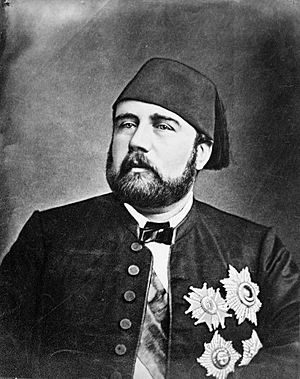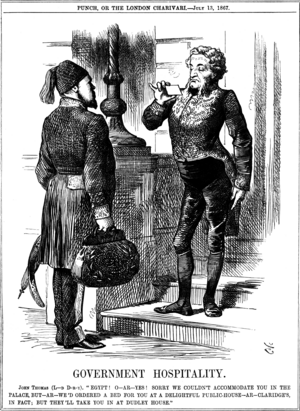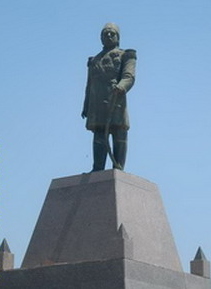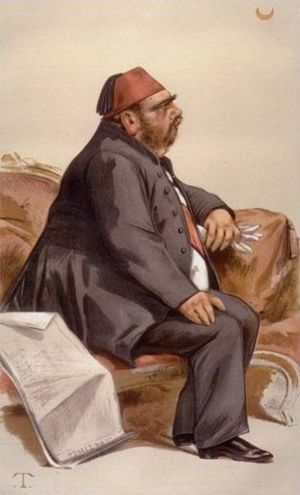Isma'il Pasha facts for kids
Quick facts for kids Ismail Pashaİsmail Paşa إسماعيل باشا |
|
|---|---|
 |
|
| Khedive of Egypt and Sudan | |
| Reign | 19 January 1863 – 26 June 1879 |
| Predecessor | Sa'id I (Wāli) |
| Successor | Tewfik Pasha |
| Born | 31 December 1830 Cairo, Egypt Eyalet, Ottoman Empire |
| Died | 2 March 1895 (aged 64) Istanbul, Ottoman Empire |
| Burial | Al-Rifa'i Mosque, Cairo, Egypt |
| Spouse |
|
| Issue | Tewfik Pasha Hussein Kamel of Egypt Fuad I of Egypt Prince Ali Jamal Princess Jamilah Fazail Hanim Princess Fatima Hanim Princess Amina Hanim Princess Nimetullah Hanim Princess Amina Aziza Hanim Princess Zainab Hanim Princess Tawhida Hanim |
| Dynasty | Muhammad Ali Dynasty |
| Father | Ibrahim Pasha |
| Mother | Hoshiyar Qadin |
| Religion | Islam |
Isma'il Pasha (born December 31, 1830 – died March 2, 1895) was a very important ruler of Egypt and Sudan. He was also known as Ismail the Magnificent because of the many changes he brought to his country. He ruled as Khedive from 1863 to 1879. A Khedive was like a viceroy or a very powerful governor.
Ismail Pasha wanted Egypt to be more like Europe. He once said, "My country is no longer in Africa; we are now part of Europe." He worked hard to modernize Egypt and Sudan. He invested a lot in new industries, cities, and expanding Egypt's borders in Africa. However, his big plans cost a lot of money. This led to Egypt owing a lot of money to European countries. Eventually, he was removed from power because of these debts. The city of Ismaïlia is named after him.
Contents
Early Life and Education
Family Background
Ismail Pasha was born in Cairo, Egypt. His grandfather was Muhammad Ali Pasha, another famous ruler of Egypt. Ismail's father was Ibrahim Pasha of Egypt. His mother was Hoshiyar Qadin. His family was of Albanian descent.
Schooling and Early Missions
Ismail Pasha went to school in Paris, France. He studied at a military school there. After finishing his education, he returned home. His uncle, Said of Egypt, was the ruler at the time. Said sent Ismail on important trips to meet leaders like the Pope and Napoléon III. In 1861, Ismail led an army of 18,000 soldiers to stop a rebellion in Sudan. He was successful in this mission.
Becoming Khedive of Egypt
After his uncle Said died, Ismail became the ruler on January 19, 1863. At first, he was called a Wāli (Governor). But Ismail wanted the higher title of Khedive. This title meant he had more power and was almost like an independent ruler, even though Egypt was still part of the Ottoman Empire.
In 1867, Ismail convinced the Ottoman Sultan Abdülaziz to officially recognize him as Khedive. He did this by offering to pay more tribute money to the Sultan. He also changed the law so that his oldest son would become ruler after him, instead of his brother. This made Egypt's rule more stable.
Ismail's Modernization Projects
Building a New Egypt
Ismail Pasha spent a lot of money to make Egypt modern. He wanted to transform it into a European-style country. He used some money to pay bribes to the Ottoman government to help his plans. A large part of the money went towards building the Suez Canal.
He built about 8,000 miles of irrigation canals. These canals helped farmers grow more crops. He also built over 900 miles of railroads. This made travel and trade much easier. He added 5,000 miles of telegraph lines for faster communication. Ismail also built 400 bridges and improved the port in Alexandria. He opened 4,500 new schools across the country.
Ismail also worked to improve the economy. He started a sugar industry and helped the cotton industry grow. He built many palaces and hosted grand parties. He even built an opera house and a theater. Over 100,000 Europeans came to work in Cairo. He helped build a new part of Cairo that looked like Paris.
Education and Government Reforms
Ismail Pasha greatly increased the money spent on education. He expanded regular schools and created special schools for technical skills. He sent students to Europe to study. This helped create a group of educated Egyptians who knew about Western ideas. In 1871, he founded a national library.
One of his important changes was creating an assembly of delegates in 1866. This group was meant to give advice to the government. Over time, its members gained more influence. They even helped change a law about land ownership in 1876.
Ismail also tried to stop the slave trade. He expanded Egypt's control in Africa. In 1874, he took over Darfur.
War with Ethiopia
Ismail Pasha dreamed of expanding Egypt's land. He wanted to control the entire Nile River and the Red Sea coast. This led to conflicts with Ethiopia, ruled by Emperor Yohannes IV.
In 1865, the Ottoman Empire gave Ismail control of the province of Habesh. This area was next to Ethiopia. Ismail's forces moved further inland into Ethiopian territory. In 1872, they took over Keren.
However, Ismail's army faced defeats against the Ethiopians. They lost battles at Gundat in 1875 and Gura in 1876. Ismail's son, Hassan, was even captured and had to be ransomed. This led to a long period of tension. In 1884, a treaty returned some land to Ethiopia. The Red Sea province that Ismail created later became the country of Eritrea.
The Suez Canal and Financial Troubles
Ismail's Role in the Canal

Ismail Pasha's time as Khedive is closely linked to the building of the Suez Canal. He agreed to and oversaw Egypt's part in its construction. When he first became ruler, he disagreed with some of the agreements made by his uncle about the Canal company. After some discussions, he had to pay the company a large amount of money.
Ismail worked hard to make himself and Egypt known around the world. In 1867, he visited Paris and London. He met Queen Victoria in Britain. He also saw a large British Navy fleet. He visited Britain again in 1869. When the Suez Canal finally opened, Ismail held a huge celebration. He invited important people from all over the world.
Growing Debts and European Control
All these big projects and the war with Ethiopia cost a lot of money. Egypt started owing huge amounts of money to European countries. These countries then used Egypt's debt to gain more control over its affairs.
One unpopular change was the new system of "mixed courts." These courts allowed Europeans to be judged by judges from their own countries, not by Egyptian courts. Egypt's national debt grew from £3 million to over £100 million. Ismail kept borrowing more money, which only made the problem worse.
In 1875, he had to sell Egypt's shares in the Suez Canal Company to the British government for about £4 million. This was the start of direct control by European powers over Egypt's money. In 1876, British and French officials were sent to Egypt to look into its finances. This led to European countries taking control of Egypt's money and government. Ismail even had to give his own lands to the nation.
Historians have noted that Egypt tried to become independent by developing its country. But by borrowing so much, it actually became more controlled by Europe.
Urabi Revolt and Exile
Many Egyptians were unhappy with European control. They supported a military officer named Ahmed ʻUrabi. This led to a rebellion known as the Urabi Revolt. Ismail Pasha hoped this revolt would help him get rid of European control. So, he did not strongly oppose Urabi and agreed to some of his demands.
Because of this, the British and French governments put pressure on the Ottoman Sultan Abdul Hamid II to remove Ismail Pasha from power. On June 26, 1879, Ismail was officially deposed. His oldest son, Tewfik Pasha, became the new Khedive.
Ismail Pasha left Egypt and went to live in Italy. Later, he was allowed to move to a palace in Istanbul, Turkey. He stayed there until his death in 1895. He was later buried in Cairo.
Legacy
Even though Ismail Pasha spoke Turkish, during his rule, the use of Arabic language slowly grew. Arabic became more important than Turkish, which had been the language of the ruling class for many years. After his reign, Arabic continued to spread and eventually replaced Turkish in the army and government. Turkish was then only used for talking with the Ottoman Sultan.
Images for kids
See also
 In Spanish: Ismail Pachá para niños
In Spanish: Ismail Pachá para niños
 | Lonnie Johnson |
 | Granville Woods |
 | Lewis Howard Latimer |
 | James West |




